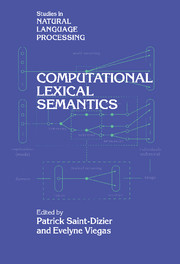Book contents
- Frontmatter
- Contents
- List of contributors
- Preface
- 1 An introduction to lexical semantics from a linguistic and a psycholinguistic perspective
- Part I Psycholinguistics for lexical semantics
- Part II Foundational issues in lexical semantics
- Part III Lexical databases
- Part IV Lexical semantics and artificial intelligence
- 13 Blocking
- 14 A non-monotonic approach to lexical semantics
- 15 Inheriting polysemy
- 16 Lexical semantics: Dictionary or encyclopedia?
- Part V Applications
- Part VI Computer models for lexical semantics
- Author index
- Subject index
16 - Lexical semantics: Dictionary or encyclopedia?
Published online by Cambridge University Press: 29 September 2009
- Frontmatter
- Contents
- List of contributors
- Preface
- 1 An introduction to lexical semantics from a linguistic and a psycholinguistic perspective
- Part I Psycholinguistics for lexical semantics
- Part II Foundational issues in lexical semantics
- Part III Lexical databases
- Part IV Lexical semantics and artificial intelligence
- 13 Blocking
- 14 A non-monotonic approach to lexical semantics
- 15 Inheriting polysemy
- 16 Lexical semantics: Dictionary or encyclopedia?
- Part V Applications
- Part VI Computer models for lexical semantics
- Author index
- Subject index
Summary
The issue of lexical content for NLU
The basic elements of most recent Natural Language Understanding (NLU) systems are a syntactic parser which is used to determine sentence structure, and a semantic lexicon whose purpose is to access the system's factual knowledge from the natural language input. In this regard, the semantic lexicon plays the key role of relating words to world knowledge. But the semantic lexicon is also used in solving some specifically linguistic issues when recovering sentence structure, and should contain linguistic knowledge. In this chapter we discuss the issue of lexical content in terms of linguistic and world knowledge, through the so-called dictionary–encyclopedia controversy. To illustrate the discussion we will describe the lexical semantics approach adopted in our NLU program processing sentences from medical records (Zweigenbaum and Cavazza, 1990). This program is a small-scale but fully implemented prototype adopting a broad view to NLU, from syntactic analysis to complex domain inferences through model-based reasoning (Grishman and Ksiezyk, 1990). The dictionary–encyclopedia controversy opposes two extreme conceptions of word definitions: according to the dictionary approach a word is described in terms of linguistic elements only, without recourse to world knowledge, whereas an encyclopedic definition includes
an indication of the different species or different stages of the object or process denoted by the word, the main types of behavior of this object or process,… (Mel'čuk and Zholkovsky, 1988).
This point has been discussed by many authors including Katz and Fodor (1963), Eco (1984), Wierzbicka (1985) and Taylor (1989).
- Type
- Chapter
- Information
- Computational Lexical Semantics , pp. 336 - 348Publisher: Cambridge University PressPrint publication year: 1995
- 1
- Cited by

